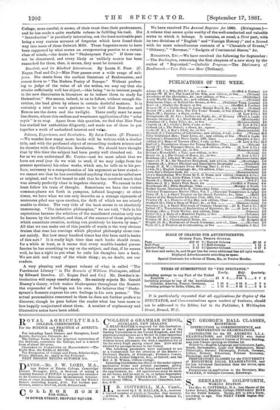Science, Experience, and Revelation. By John Coatis. (F. Pitman.) —We
wonder how many more books will be written with a similar title, and with the professed object of reconciling modern science and its theories with the Christian Revelation. We should have thought that by this time the subject had been pretty well threshed out. As far as we can understand Mr. Coutts—and we must admit that we have not read (nor do we wish to read, if we may judge from the present specimen) his other works, which are, he tells us in his pre- face, necessary to a comprehension of his argument as here stated— we cannot see that he has contributed anything that can be called new or original, and we feel bound to add that he has involved much that was already perfectly clear in hopeless obscurity. We cannot in the least follow his train of thought. Sometimes we have the veriest common-places set forth in pompons, inflated language ; at other times, we have what we can only describe as a strange rigmarole of sentences piled one upon another, the drift of which we are utterly unable to divine. The very title of the book seems to us absolutely unmeaning. "The inductive philosopher," we are told, "fails in his aspirations because the relations of the manifested creation only can be known by the intellect, and thus, of the essence of those principles which constitute creation, nothing can positively be known by man." All that we can make out of this jumble of words is the very obvious truism that man has cravings which physical philosophy alone can- not satisfy. But bow many hundred times has this been said in books of this sort ? It is really high time that such books should cease, for a while at least, as it seems that every muddle-headed person fancies he has something to say on the subject, and that, if he means well, he has a right to put what he calls his thoughts into a book. We are sick and weary of the whole thing ; so, no doubt, are our readers.
A very pleasing and elegant volume of what is called "The Parchment Library" is The Sonnets of William Shakespere, edited
by Edward Dowden. (C. Kegan Paul and Co.) Mr. Dowden's in- troduction will repay careful study. He entirely rejects Mr. Gerald Massey's theory, which makes Shakespeare throughout the Sonnets the expounder of feelings not his own. He believes that "Shake- speare's Sonnets express his own feelings in his own person." The actual personalities concerned in them he does not further profess to discover, though be puts before the reader what has been more or less happily conjectured about them. A number of explanatory and illustrative notes have been added.






























 Previous page
Previous page